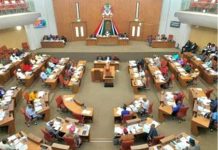Kebba Touray
Bakary Jammeh, the Governor of the Central Bank of the Gambia, told journalists on Friday that the stock of domestic debt has increased to D 33.6 billion.
Jammeh made this remark during the Monetary Committee Meeting at the Central Bank of the Gambia hall.
He said: “The COVID-19 pandemic is having a devastating impact on the global economy. The socio-economic impact of the strict containment measures needed to curb the spread of the virus is enormous. These measures have disrupted economic activity, created massive uncertainty, and economies around the world are plunging into recession. Although countries have started to gradually and cautiously reopen economies, the risks remain elevated”.
He continued to say the International Monetary Fund (IMF) forecast the global economy to contract by 3.0 percent in 2020, largely reflecting a combination of demand and supply shocks due mainly to the pandemic. However, the forecast is underpinned by large scale uncertainty. In sub-Saharan Africa, the projected income losses due to the crisis are threatening to reverse the economic progress made in recent years, he said. He added the region is expected to register a negative growth of 1.6 percent in 2020.
He noted: “The goods account deficit is estimated at US$155.1 million (8.6 percent of GDP) in the first quarter of 2020, compared to a deficit of US$85.1 million (4.8 percent of GDP) in the same period in 2019. Export receipts increased by 39.9 percent to US$50.0 million during the period under review. Imports increased by 67.2 percent to US$209.4 million in 2020 from US$125.3 million in the same period in 2019”.
Jammeh said the surplus in the services accounts stood at US$29.0 million in the first three months of 2020 compared to US$46.5 million in the same period last year, due largely to the decrease in income from personal travels.
He said: “The gross international reserves stood at US$265.61 million and it is projected at over 4 months of next year’s imports of goods and services”.
He said total government expenditure and net lending increased slightly to D5.02 billion (5.1 percent of GDP), compared to D5.01 billion (5.7 percent of GDP) in 2019.
He averred that recurrent expenditure increased by 23.5 percent to D4.1 billion (4.1 percent of GDP) during the period under review, wherein Capital expenditure, on the other hand, decreased to D948.7 million (0.96 percent of GDP) in the first quarter of 2020 from D1.7 billion (1.95 percent of GDP) in the same period last year.
He said: “Gambia’s domestic debt remains high. The stock of domestic debt increased to D33.6 billion or 33.2 percent of GDP as at end-April 2020 from D32.5 billion or 35.7 percent of GDP in the corresponding period in 2019. The stock of Treasury and Sukuk Al Salaam bills increased by 4.0 percent to D20.2 billion as at end-April 2020”.
He noted Money supply (M2) growth slowed from 19.2 percent at end-March 2019 to 18.1 percent as at end of March 2020, the net foreign assets of the banking system stood at D15.7 billion compared to D12.8 billion a year earlier, whereas net domestic assets grew by 15.5 percent to D27.1 billion during the period under review.
He disclosed: “Year-on-year, reserve money growth decelerated markedly from 23.3 percent in March 2019 to 13.0 percent in the year to end-March 2020. Growth in reserve money was driven largely by the increase in the net foreign assets (NFA) of the Central Bank”.
He further stated that Inflation remained largely subdued due to weak domestic demand, low global oil prices, and stable exchange rate. Headline inflation declined to 5.6 percent in April 2020 from 6.9 percent in April 2019, driven largely by the deceleration in non-food inflation.
He said the consumer price inflation of food and non-alcoholic beverages increased from 6.27 percent in April 2019 to 6.97 percent in April 2020. The major drivers of food inflation during the period were Bread Cereals, Meat, Fish, Fruits, and non-alcoholic beverages.
He explicated that Non-food inflation decelerated to 3.3 percent in April 2020 from 8.7 percent in April 2019, while consumer price inflation for all the components of non-food inflation decreased except transportation and miscellaneous items.
He informed that the Committee also observed the disruptive effect of the COVID-19 pandemic on the Gambian economy, especially on tourism and related activities as well as trade and investment.
Jammeh stressed that the Central Bank’s quarterly Business Sentiment Survey indicated a significant shift in business sentiment, since the last survey due to the impact of COVID-19 pandemic, as such Businesses project low economic activity in the remainder of 2020.
The Committee noted that the outlook for inflation is favorable with both the headline inflation and core inflation trending downwards.
He said: “The headline inflation decelerated markedly in April 2020, driven mainly by the decline in non-food inflation. The current rate of inflation is broadly in line with expectations”.
He said there are risks to the outlook, which include substantial uncertainty about the trend of global food prices in the light of current developments given supply chain disruptions due to the COVID-19 pandemic.
He stated that the committee has decided to reduce the Monetary Policy rate by 2 percentage points to 10 percent to support the economy, as well as Reduce the statutory required reserve ratio by 2 percentage points to 13 percent.
This he noted, will release about D700 million liquidity to banks and maintain the interest rate on the standing deposit facility at 3 percent and the interest rate on the standing lending facility at 1 percentage points above the monetary policy rate.
He stressed: “Banks are highly encouraged to translate these to increased lending to the private sector”.
He said “The Committee will continue to closely monitor the situation and stands ready to act accordingly”.





















